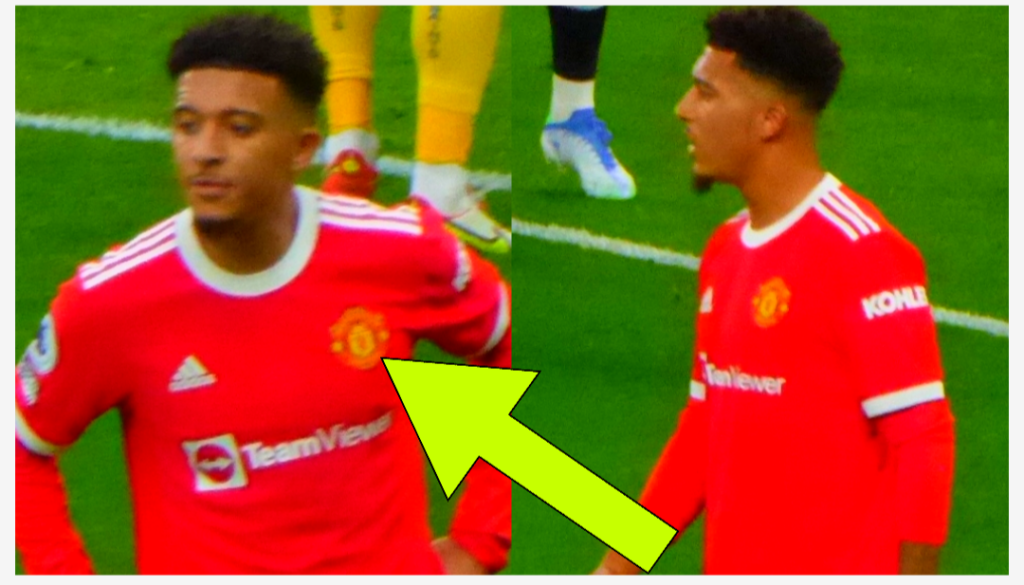Exclusion from Manchester United WhatsApp Group Reflects Ongoing Discord in Jadon Sancho’s Relationship with Erik ten Hag
Amidst the backdrop of the beautiful game, the ongoing narrative of Jadon Sancho’s tumultuous journey at Manchester United has captivated the football world. Within this narrative, a deepening discord between the talented winger and his manager, Erik ten Hag, has emerged, sending shockwaves throughout the club.
The narrative unfolds as Sancho was relegated from the Manchester United first team, a pivotal moment in his career trajectory, resulting from his exclusion from the squad during the team’s crucial 3-1 loss to Arsenal. The driving force behind this pivotal decision, as articulated by Ten Hag, was a perceived lack of commitment and attitude exhibited by Sancho during training sessions.
In an unexpected twist, Sancho took to the realm of social media to confront his manager’s public critique. His response, veiled in subtlety, cast doubt on the veracity of Ten Hag’s assessment. This public exchange of words exacerbated an already fragile relationship, ultimately culminating in Sancho’s banishment from first-team facilities, including the canteen. Consequently, the young football star found himself relegated to consuming his meals from a lunchbox within the confines of his car.
The most recent developments suggest that Sancho’s exclusion has extended to a fundamental communication platform, namely a WhatsApp group led by Erik ten Hag, employed for the dissemination of critical information to the players. The ramifications of this ongoing dispute between Ten Hag and Sancho are palpable in the schisms it has engendered within the Manchester United team. Some players sympathize with Sancho, viewing his treatment as unfair, while others advocate for his reconciliation through an apology as a potential avenue for rescuing his career at Old Trafford.
Nonetheless, the prevailing sentiment implies that the likelihood of a resolution and reconciliation remains remote. The 23-year-old winger appears destined to part ways with Manchester United, with the prospect of a transfer on the horizon, either in the upcoming January transfer window or the subsequent summer window. Ten Hag, for his part, has steadfastly declined to engage with inquiries pertaining to the Sancho situation in recent weeks, redirecting the conversation to players who are “available for selection.”
Ten Hag has articulated his stance, stating, “He is not available, so, in this moment, he is not important because he can’t contribute.” A testament to his commitment to the team’s welfare, Ten Hag emphasizes, “It’s in favor of the team. That is what my decision is based on. It is not about me being strict. No. This is in favor of the team. I don’t think about [Sancho’s tweet], and I don’t talk about that. The players who are there and available deserve me. I have to guide them, I have to prepare them. It is about that. I only focus on the players who are available.”
The predicament of the Sancho-Ten Hag conflict has become a prominent talking point in the world of football and among the passionate Manchester United fanbase. Jadon Sancho, who arrived at Old Trafford amid great fanfare from Borussia Dortmund, was heralded as a transformative talent, expected to reshape the trajectory of the club.
Yet, Sancho’s journey at Manchester United has been fraught with adversity. The initial excitement surrounding his transfer has dissipated, and his performance on the pitch has proven inconsistent. The public discord and altercations have further exacerbated his challenges in cementing his position within the team.
The decision to sideline Sancho from the first team has raised pertinent questions regarding the disciplinary mechanisms at Manchester United. This complex issue calls for an evaluation of both the player’s behavior and the manager’s aptitude in handling such situations. Striking the right balance between maintaining discipline and preserving player morale is a conundrum that requires astute management.
Within this context, the public exchange between Sancho and Ten Hag has not only strained their working relationship but has also generated schisms within the team. While some players perceive Sancho’s treatment as unduly harsh, others advocate for personal responsibility in the matter. These divergent viewpoints have the potential to disrupt the cohesiveness of the team, a vital component for success on the field.
The most profound consequence of this discord is the imminent departure of Jadon Sancho from Manchester United. Whether this departure materializes in the upcoming January transfer window or the subsequent summer window, it represents a paradigm shift from the initial promise associated with Sancho’s arrival. The anticipated transfer raises profound questions regarding the club’s transfer strategy and the art of optimizing a significant investment that has not yielded the expected returns.
As Manchester United navigates this intricate terrain, the focus naturally shifts towards the future. The management’s response to these challenges and their approach to disciplinary matters and player relationships will be closely scrutinized. The fate of Jadon Sancho remains uncertain, and his transition from a celebrated English talent to a potential exit from Old Trafford epitomizes the unpredictability and drama inherent in the world of football.

